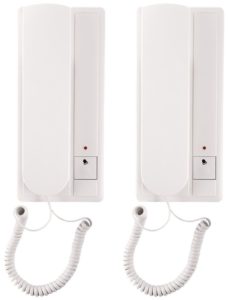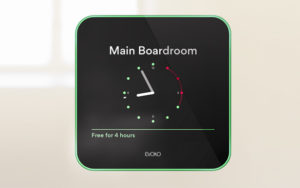- Home
- Audio and Video System
- PABX System
PABX System Suppliers In Abu Dhabi, Dubai & UAE
A PBX (private branch exchange) is a telephone system within an enterprise that switches calls between enterprise users on local lines while allowing all users to share a certain number of external phone lines. The main purpose of a PBX is to save the cost of requiring a line for each user to the telephone company’s central office.
The PBX is owned and operated by the enterprise rather than the telephone company (which may be a supplier or service provider, however). Private branch exchanges used analog technology originally. Today, PBXs use digital technology (digital signals are converted to analog for outside calls on the local loop using plain old telephone service (POTS ).
A PBX includes:
Telephone trunk (multiple phones) lines that terminate at the PBX
A computer with memory that manages the switching of the calls within the PBX and in and out of it
The network of lines within the PBX
A console or switchboard for a human operator (optional)
Phone Systems Installations
We can be your source for advanced phone systems & communications solutions at very competitive prices. From additions to new installs, voicemail, audio conferencing, call auto-attendant, telephone accounting, and wireless, we do it all. We take great pride in our phone system installation, testing and certification procedures for Phone Cabling. Our main goal is total customer satisfaction through the highest quality workmanship, top-quality equipment and built-in upgrade potential for your systems and network. Our industry knowledge and engineering expertise can ensure the best protection of your Voice and Data systems investment. Our staff is experienced with the widest diversity of phone equipment and wiring. All businesses that have multiple extension lines need a PBX|PABX System, but that doesn’t have to mean a hefty price tag each month. Technology like Internet calling creates monthly saving for all aspects of the phone system, including the PBX.
PBX | PABX Systems – Installation, Upgrades and Maintenance Services
Our company provides installations, upgrades and maintenance services for PBX | PABX Telephony and PBX | PABX phone systems using VOIP. We also offer products, such as PBX | PABX Telephone Systems, PBX | PABX Phones, VoIP Gateways, and Memory Cards. Contrary to a common belief that these PBX | PABX Systems are expensive, we can show you that you can get enhanced communication for your business or for your smart home at very low prices PBX (Private Branch Exchange) is the software that connects multiple incoming calls to the right company departments and connects internal office calls with each other. With a PBX, incoming calls first reach the automated attendant that helps direct the call to the right department and employee extension line with a friendly pre-recorded voice. Outgoing calls are routed through the PBX to connect to outside callers.
4 Major Types Of PABX Systems
There are 4 major types of PBX systems, and each has particular strengths and weaknesses. As a result, different types of businesses will get the most out of different PBX systems, depending on their size, the average number of callers, and the resources available for new equipment.
1. Traditional PBX
A traditional PBX connects callers through multiple phone lines to multiple extensions, as stated above. Unlike the other entries on this list, this type of PBX uses traditional landlines to make and connect calls. Other types of PBX systems use Voice over Internet Protocol (VoIP) technology for cheap Internet calling, meaning this type of PBX system is more expensive to run. They also require a large amount of equipment with expensive down-payments and maintenance fees. Many businesses already have these legacy systems in place from before VoIP was popular, and so businesses picking a PBX today should almost never go with an outdated traditional model. Businesses that already have the IT department to maintain and support such a system are the only ones that would use it, and even then only if they already have one.
2. IP PBX
An IP PBX is strictly an upgrade to a traditional PBX. Like a traditional PBX, there is a large start-up cost to purchase and install the network, but overall costs are lower and more features are available thanks to VoIP calling. A business VoIP phone system saves businesses around 50% on the average phone bill. An IP PBX is also easier to maintain. Traditional PBX systems are limited by the number of phone lines they have, while an IP PBX is only limited by bandwidth space on a company’s Internet connection. Since the call data is compressed into digital packets, each call takes up very little space. An IP PBX is good for companies that want direct control over exactly how their PBX is configured in-house, and don’t want to pay subscription fees associated with other PBX options.
3. Hosted PBX
A hosted VoIP PBX is the most popular option for businesses. A hosted PBX is operated off-site maintained by a VoIP provider. Since it is at an off-site location, businesses simply pay a low monthly fee to have all of the advantages of a PBX phone system with none of the headaches. Since there is no initial investment, a hosted PBX option is almost always the best choice for a small business. Even businesses that can afford a PBX system of their own might want to save money by using a hosted PBX system. A good rule of thumb is that if a business has more than 20 people operating phones, it will be cheaper in the long run to operate an IP PBX of their own, but every case will be different.
4. Virtual PBX
A virtual PBX is almost exactly the same as a hosted PBX and is often called a cloud PBX. These usually cost less than their hosted PBX counterparts, but also offer fewer features. Often, a virtual PBX will only run internal calls through the Internet, so companies that don’t make a lot of external calls find them attractive. For businesses that only need to use a few calling features like voicemail and hold music, a cheap virtual PBX may be the way to go. In any case, a VoIP PBX will save a business time and money, while increasing sales. By managing phone lines effectively, companies with PBX systems installed can pay for fewer phone lines overall and take advantage of cheap VoIP calling for yearly savings.
GXW4100 Series
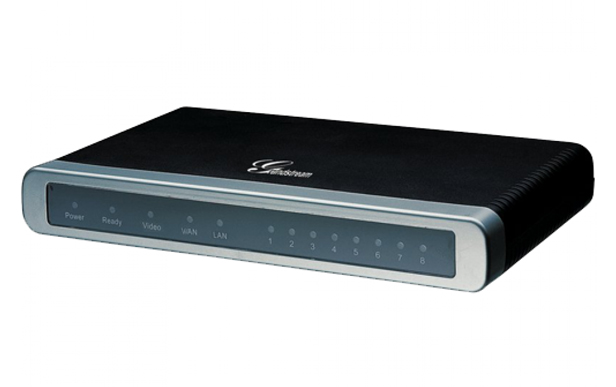
The GXW410x FXO gateway series enables businesses of all sizes to create and deploy a VoIP and analog hybrid solution. Make deployments easy by seamlessly connect multiple locations and all devices within an office to any hosted or on premise IP PBX network.
Specification
Features
- 4 or 8 ports
- 2 10/100 Mbps network ports
- Comprehensive codec support, caller ID, flexible dial plans and security protection
- Advanced security protection with SRTP
- Designed and tested for full interoperability with leading IP-PBXs, soft-switches and SIP-based environments
- PSTN Failover on power failure
UCM6200 series
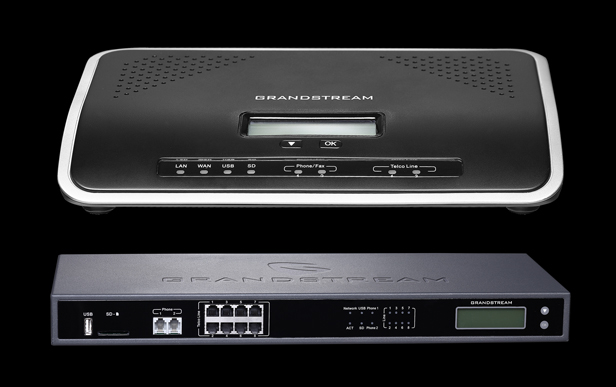
Designed to provide a centralized solution for the communication needs of businesses, the UCM6200 series IP PBX appliance combines enterprise-grade voice, video, data, and mobility features in an easy-to-manage solution. This IP PBX series allows businesses to unify multiple communication technologies, such as voice, video calling, video conferencing, video surveillance, data tools, mobility options and facility access management onto one common network that can be managed and/or accessed remotely. The secure and reliable UCM6200 series delivers enterprise-grade features without any licensing fees, costs-per-feature or recurring fees.
The same industry-leading platform that we designed for the UCM6100 series, which continues to be enhanced month by month with more and more features and functionalities, will be extended to the UCM6200 series. Looking for a more powerful upgrade? We have redesigned our 8 FXO port model, the UCM6208, to offer the ability to support more users and more concurrent calls, as it supports up to 800 users and up to 100 concurrent calls.
Specification
Features
- UCM6202 and UCM6204 support up to 500 users and 50/75 concurrent calls, UCM6208 supports up to 800 users and 100 concurrent calls
- Auto Discovery and Zero Configuration of Grandstream SIP endpoints
- Integrated 2/4/8 PSTN trunk FXO ports, 2 analog telephone FXS ports with lifeline capability and up to 50 SIP trunk accounts
- Gigabit network ports with Integrates PoE, USB, SD card
- Supports up to a 5-level IVR (Interactive Voice Response)
- Built-in call recordings server; recordings accessible via web user interface
- Built-in Call Detail Records (CDR) for tracking phone usage by line, date, etc.
- Supports multi-language auto-attendant and call queue to efficiently handle incoming calls
- Strongest possible security protection using SRTP, TLS and HTTPS encryption
- Supports any SIP video endpoint that uses the H.264, H.263 or H.263+ codecs
NEC SL2100
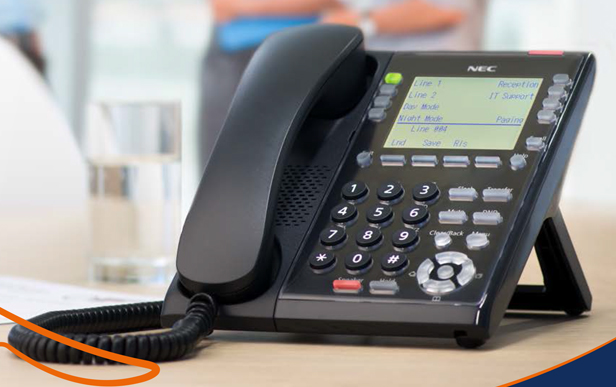
The versatile SL2100 Communications System can be operated as a highly cost-effecitve VoIP-enabled phone system, an easily expandable unified communications platform, or a reliable digital PBX with outstanding upgrade potential.
With much of the SL2100’s advanced functionality already built into the system, the SL2100 reduces the need for extra hardware, delivering a highly functional telephone system with low running costs at an entry-level price.
These standard features enable your business to meet its need for mobility, security and connectivity, and help ensure that customer servive levels are kept at a maximum
The NEC SL2100 provides excellent reliability and value in a premisis-based system.
Specification
- Premises-based
- Smartphone SIP App
- Mobile Extension
- On-premises mobility
- Low IT maintenance requirements
- Built-in Audio Conferencing
- VoIP Enabled
- InUC – Built-in collaboration
- Automatic Call Distribution (ACD)
- Contact Center
- Enhanced Voicemail
- Music on Hold
- Mobility / Remote / Home Office User Support
- Auto Attendant
- Audio Conferencing
- Video Conferencing & Collaboration (license required)
- Call Recording
- E911
Panasonic KX-TES824
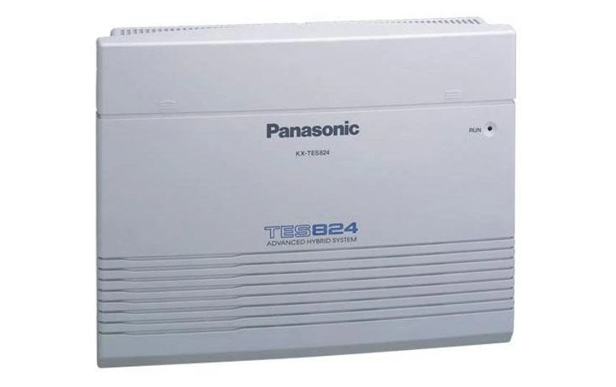
KX-TES824 is supplied configured for 3 lines and 8 extensions, and can be expanded to a maximum configuration of 8 lines and 24 extensions. DISA/Message on busy is a new feature as is Extension CLI (option) and USB for PC programming. The new Panasonic KX-TES824 offers a superb solution for most small to medium size businesses. Features include group working, system speed dials, personal speed numbers, internal / external music-on-hold, paging and auto-attendant.
The KX-TES824 Control Unit provides an initial capacity for three exchange lines and eight extensions but with the addition of cards can easily expand up to eight exchange lines and twenty-four extensions. Extensions can be standard telephones, cordless phones or Panasonic System-Phones.
Specification
- Maximum configuration – 8 Analogue CO / 24 Extensions
- Advanced Hybrid PBX System
- 3 outside (CO) lines and 8 extensions.
- Easily expanded with up to 8 outside (CO) lines and 24 extensions.
- Built in Voice Message
- 3-level Automatic Reception with Voice Guidance
- Caller ID Display on SLT’s and APT’s “An optional card is required”
- Door phones, Door Openers, and Doorbells “An optional card is required”
- Uniform Call Distribution (UCD) with message
Yeastar S-Series
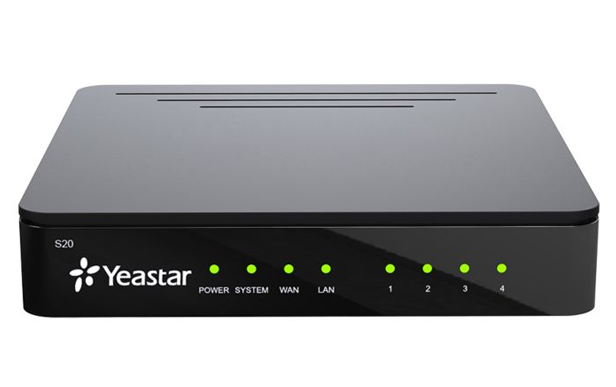
Yeastar’s PBX-S20, S-Series VoIP PBX is designed with small and medium-sized enterprises in mind and supports up to 20 users. It delivers impressive cost savings, productivity and efficiency improvements while delivering power, performance, quality and peace of mind. The S-Series features comprehensive auto provisioning, advanced plug and play capability, as well as an intuitive Metro UI driven by point-and-click configuration, accessible from any location. The PBX-S20 is also compatible with the Linkus Mobile and Desktop Client.
Specification
PBX-S20
- Users : 20
- Max Concurrent Calls : 10
- Max FXO/FXS Ports : 4
- Max BRI Ports : 4
- Max GSM Ports : 1
- Max PRI (E1) : N.A
- Call Recording : Micro-SD
- LAN/WAN : 100mps
- Power : DC 12v 1a
- Mounting : Wall or Desk
PBX-S50
- Users : 50
- Max Concurrent Calls : 25
- Max FXO/FXS Ports : 8
- Max BRI Ports : 8
- Max GSM Ports : 4
- Max PRI (E1) : N.A
- Call Recording : SD
- LAN/WAN : 1Gbps
- Power : AC 220v
- Mounting : Rack Mount
PBX-S300
- Users : 300 (up to 500)
- Max Concurrent Calls : 60 (up to 120)
- Max FXO/FXS Ports : 24
- Max BRI Ports : 24
- Max GSM Ports : 6
- Max PRI (E1) : 3
- Call Recording : SD or HDD
- LAN/WAN : 1Gbps
- Power : AC 220v
- Mounting : Rack Mount
Get A Quote
How Can I Help You?






